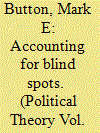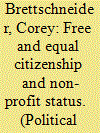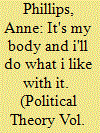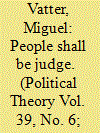| Srl | Item |
| 1 |
ID:
107947


|
|
|
|
|
| Publication |
2011.
|
| Summary/Abstract |
This essay is concerned with the challenges that moral "blind spots" create for the presence and endurance of democratic virtues under conditions of pluralism. A moral blind spot refers to the occlusions in individual moral perceptions and the limits that circumscribe moral sympathies owing to our ineluctable partialities as socially embedded beings. Blind spots constitute a tragic feature of human perception and moral judgment that facilitate and undermine human agency at once. Yet, far more problematic from the perspective of democratic epistemology and normative ethics is the denial or willful forgetfulness of their place in our individual and collective lives, and the concomitant failure to account for moral blind spots so as to check their most pernicious effects. Accounting for moral blind spots in practice requires actively planning for their presence through the cultivation of the "pathos of distance" towards ourselves and our collective political identities and social institutions.
|
|
|
|
|
|
|
|
|
|
|
|
|
|
|
|
| 2 |
ID:
107952


|
|
|
|
|
| Publication |
2011.
|
| Summary/Abstract |
As the twentieth century drew to a close, political theorists of various stripes
argued that many aspects of human existence-including not only the subconscious, but also emotions, emotional states, rhetoric, aesthetics, judgments-
play a larger role in politics than does rational argument alone. Some had
argued for the "death of Man," claiming that the human is no longer a meaningful category. In this new century, the three books under review here try to
make arguments for ways to study this displaced subject, actor, human. Each
of the three books is scholarly and erudite; each is more or less successful on
its own terms. What is their contribution to political theory?
|
|
|
|
|
|
|
|
|
|
|
|
|
|
|
|
| 3 |
ID:
107951


|
|
|
| 4 |
ID:
107948


|
|
|
|
|
| Publication |
2011.
|
| Summary/Abstract |
What, if any, is the problem with treating bodies as objects or property? Is there a defensible basis for seeing bodies as different from "other" material resources? Or is thinking the body special a kind of sentimentalism that blocks clear thinking about matters such as prostitution, surrogate motherhood, and the sale of spare kidneys? I argue that the language we use does matter, and that thinking of the body as property encourages a self/body dualism that obscures the power relations involved in all contracts that cedes authority over the body. Recognising the self as embodied, however, also makes it harder to insist on sharp distinctions between activities that involve the body and those that "just" involve the mind, hence harder to justify refusing payment for explicitly body services while condoning it for those to which the body is more incidental. I therefore provide a modest defence of monetary compensation for those who "donate" bodily products or services. Compensation does not, however, mean markets for there is at least one sense in which the body is special. This is that more so, and more intrinsically than other markets, markets in body parts or bodily services depend on inequality. I use this to make a case against such markets.
|
|
|
|
|
|
|
|
|
|
|
|
|
|
|
|
| 5 |
ID:
107949


|
|
|
|
|
| Publication |
2011.
|
| Summary/Abstract |
This essay offers an interpretation of Kant's republicanism in light of the problem of political judgment. Kant is sometimes thought to base his conception of law on an idea of sovereignty drawn from Hobbes and Rousseau, which would leave little room for popular contestation of the state. In this essay, I reconstruct Kant's account of the rule of law by bringing out the importance of his theory of judgment. I argue that for Kant the civil condition is ultimately characterized by a contest between the judgment of the sovereign and the judgment of the people, which corresponds to the determinative and reflective employments of political judgment, respectively. On this view, popular sovereignty is ultimately located in the people's power to judge politically and contest publicly the state.
|
|
|
|
|
|
|
|
|
|
|
|
|
|
|
|
| 6 |
ID:
107950


|
|
|